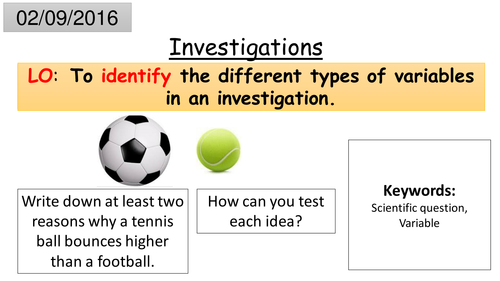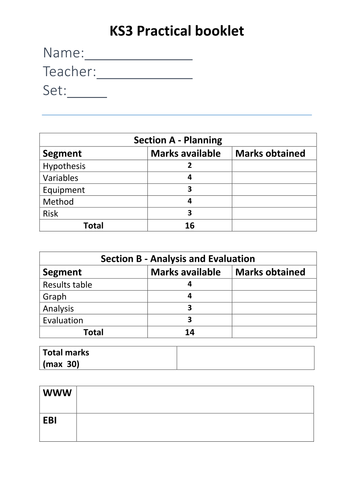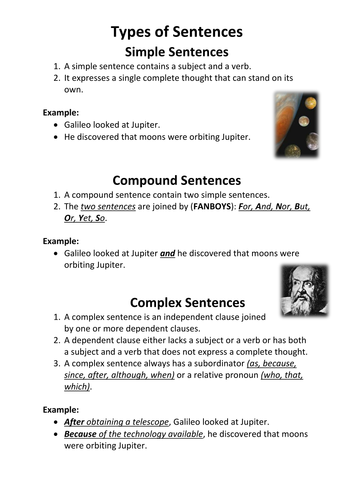243Uploads
106k+Views
54k+Downloads
Chemistry

Scientific investigations (Introduction lesson 2/4)
Designed to be the second lessons for Year 7s (2/4).
Learning outcomes:
(*) List the scientific method into the correct order.
(*) Identify questions that can be answered using science.
(*) Identify the different variables in Brainiac experiments.
Students will learn the difference scientific variables (Control, Independent, Dependent) and how to spot them in written situations and videos.
Students also learn what makes a question scientific using Wolfgang Pauli's "not even wrong" quote.

KS3 Science Yr8 Chemistry Student response sheets
A collection of student feedback sheets based on exam style questions.
Best used when you have identified an area of weakness.
This should help make marking meaningful.
Topics include Periodic Table, Separation Techniques, Metals and acids, The Earth

KS3 Science Yr7 Chemistry Student response sheets
A collection of student feedback sheets based on exam style questions.
Best used when you have identified an area of weakness.
This should help make marking meaningful.
Topics include Particles, Elements and compounds, Reactions, Acids and alkalis

KS3 Chemistry controlled assessment Full Resources (Rates of Reaction)
This resources was modelled using the AQA KS4 ISA system.
This resource contains:
*the practical workbook - fully scaffold with hints and prompts.
*mark-scheme
*Technician sheet
*Lesson power-points (this should last a week ~4 lessons)
*This particular practical investigates effect of concentration on reaction rate

Science 101 (Introduction lesson 1/4)
Designed to be the first lessons for Year 7s (1/4).
Learning outcomes: (*) State what an observation is. (*) Describe the difference between observation and inference. (*) Use data to formulate an inference about fossil distribution.
Also included are sentence types (Simple, Compound, Complex) with scientific examples to build literacy skills in later lessons.

Science 101 (Introduction lesson 1/4)
Designed to be the first lessons for Year 7s (1/4).
Learning outcomes: (*) State what an observation is. (*) Describe the difference between observation and inference. (*) Use data to formulate an inference about fossil distribution.
Also included are sentence types (Simple, Compound, Complex) with scientific examples to build literacy skills in later lessons.

C6.3 Extracting aluminium
AQA GCSE Sciences (9-1)
Chemistry: C6 Electrolysis
Lesson 3: C6.3 Extracting aluminium
Based on the Kerboodle Resources
The AQA Kerboodle worksheet are not included so as to be acting within the TES code of conduct.

C10.1 Reactions of alkenes
AQA GCSE Sciences (9-1)
Chemistry: C10 Organic Reactions
Lesson 1: C10.1 Reactions of alkenes
Based on the Kerboodle Resources
The AQA Kerboodle worksheet are not included so as to be acting within the TES code of conduct.

C10.3 Reactions of alcohols
AQA GCSE Sciences (9-1)
Chemistry: C10 Organic Reactions
Lesson 3: C10.3 Reactions of alcohols
Based on the Kerboodle Resources
The AQA Kerboodle worksheet are not included so as to be acting within the TES code of conduct.

C12.1 Pure substances and mixtures
AQA GCSE Sciences (9-1)
Chemistry: C12 Chemical analysis
Lesson 1: C12.1 Pure substances and mixtures
Based on the Kerboodle Resources
The AQA Kerboodle worksheet are not included so as to be acting within the TES code of conduct.

C12.2 Analysing chromatograms
AQA GCSE Sciences (9-1)
Chemistry: C12 Chemical analysis
Lesson 2: C12.2 Analysing chromatograms
Based on the Kerboodle Resources
The AQA Kerboodle worksheet are not included so as to be acting within the TES code of conduct.

C12.5 Tests for negative ions
AQA GCSE Sciences (9-1)
Chemistry: C12 Chemical analysis
Lesson 5: C12.5 Tests for negative ions
Based on the Kerboodle Resources
The AQA Kerboodle worksheet are not included so as to be acting within the TES code of conduct.

C13.3 Greenhouse gases
AQA GCSE Sciences (9-1)
Chemistry: C13 The Earth’s atmosphere
Lesson 3: C13.3 Greenhouse gases
Based on the Kerboodle Resources
The AQA Kerboodle worksheet are not included so as to be acting within the TES code of conduct.

C13.4 Global climate change
AQA GCSE Sciences (9-1)
Chemistry: C13 The Earth’s atmosphere
Lesson 4: C13.4 Global climate change
Based on the Kerboodle Resources
The AQA Kerboodle worksheet are not included so as to be acting within the TES code of conduct.

C8.3 The effect of temperature
AQA GCSE Sciences (9-1)
Chemistry: C8 Rates and equilibrium
Lesson 3: C8.3 The effect of temperature
Based on the Kerboodle Resources
The AQA Kerboodle worksheet are not included so as to be acting within the TES code of conduct.

C8.8 Dynamic equilibrium
AQA GCSE Sciences (9-1)
Chemistry: C8 Rates and equilibrium
Lesson 8: C8.8 Dynamic equilibrium
Based on the Kerboodle Resources
The AQA Kerboodle worksheet are not included so as to be acting within the TES code of conduct.

C9.4 Cracking
AQA GCSE Sciences (9-1)
Chemistry: C9 Crude oil and fuels
Lesson 4: C9.4 Cracking
Based on the Kerboodle Resources
The AQA Kerboodle worksheet are not included so as to be acting within the TES code of conduct.

C9.2 Fractional distillation
AQA GCSE Sciences (9-1)
Chemistry: C9 Crude oil and fuels
Lesson 2: C9.2 Fractional distillation
Based on the Kerboodle Resources
The AQA Kerboodle worksheet are not included so as to be acting within the TES code of conduct.

C6.2 Changes at the electrodes
AQA GCSE Sciences (9-1)
Chemistry: C6 Electrolysis
Lesson 2: C6.2 Changes at the electrodes
Based on the Kerboodle Resources
The AQA Kerboodle worksheet are not included so as to be acting within the TES code of conduct.

C7.1 Exothermic and Endothermic reactions
AQA GCSE Sciences (9-1)
Chemistry: C7 Energy changes
Lesson 1: C7.1 Exothermic and Endothermic reactions
Based on the Kerboodle Resources
The AQA Kerboodle worksheet are not included so as to be acting within the TES code of conduct.




















